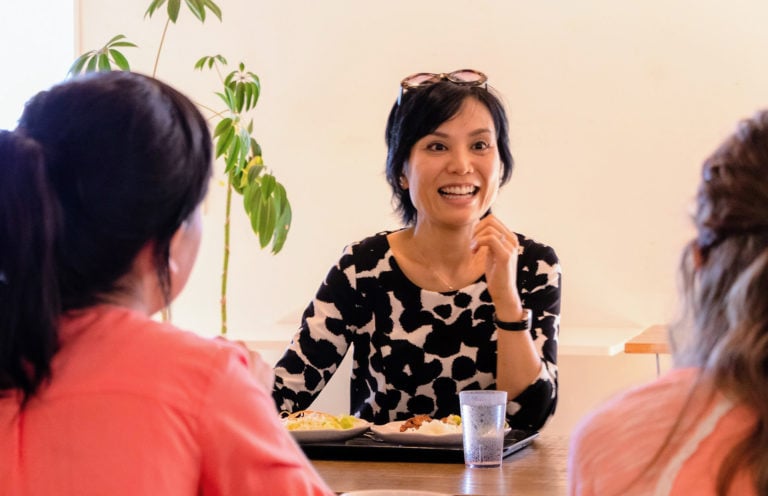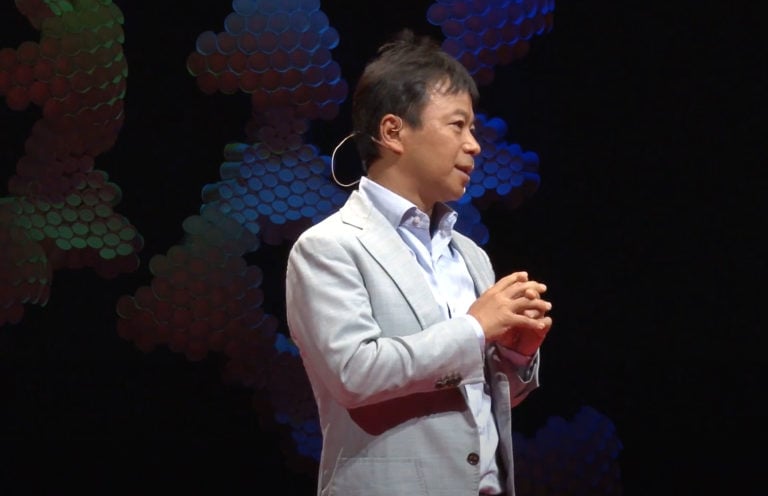In our previous posts about Manaha (Japan / Class of 2025), we explored her projects on Hiroshima (Part I) and her efforts to reduce food waste at UWC ISAK Japan (Part II). This third and final installment of the leadership series will delve into the driving force underlying all these different projects: her passion for improving the Japanese education system. This passion is also why she eagerly applied to UWC ISAK Japan.
Part III: Advocate for Change in Japanese Education
Culture shock at UWC ISAK Japan
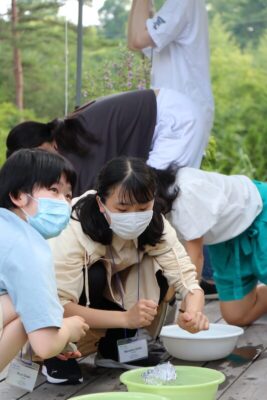 Participating in UWC ISAK Japan’s Summer School 2021 program was a culture shock for Manaha. “I had never met anyone who spoke fluent English before,” explains Manaha. “Even if the program happened during the Covid-19 pandemic when only citizens or residents of Japan could participate, I was impressed by the diversity on campus.”
Participating in UWC ISAK Japan’s Summer School 2021 program was a culture shock for Manaha. “I had never met anyone who spoke fluent English before,” explains Manaha. “Even if the program happened during the Covid-19 pandemic when only citizens or residents of Japan could participate, I was impressed by the diversity on campus.”
She started her projects on Hiroshima (Part I) at Summer School and was highly motivated to pursue a UWC ISAK Japan education to achieve this project.
Dreams of a different education
Coming from a public school in Fukuoka, on the Southern island of Kyushu, the road to UWC ISAK Japan took a lot of work for Manaha. Her junior high school English teacher was the first person to introduce her to the outside world. “He used to work at JICA [Japan International Cooperation Agency], so he visited more than 30 countries and spoke several languages.” But besides that, she still needed to learn how the world could look outside Japan. Still, she knew she was attracted to this world. And she finally found UWC ISAK through hours of online research on other types of education than her own and through encountering UWC alum stories.
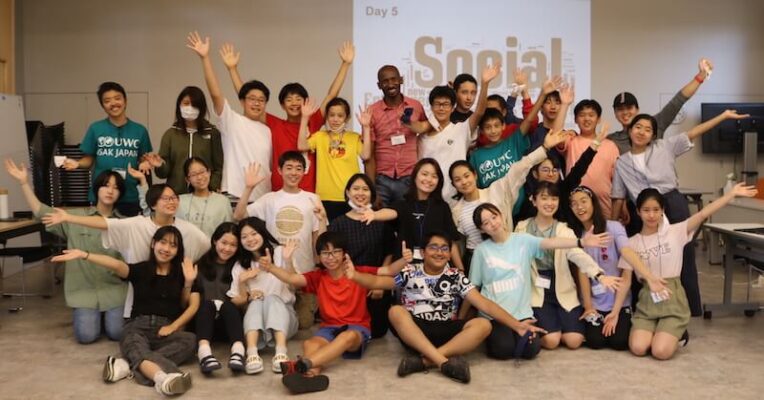
She was determined to apply for its Summer School program. Still, it took her five months to dare to tell her plan to her parents and ask their permission to attend. “They thought it was a strange religious school at first,” Manaha explains. “I had to convince them. And I thought that was the hardest part.”
The road to a better education
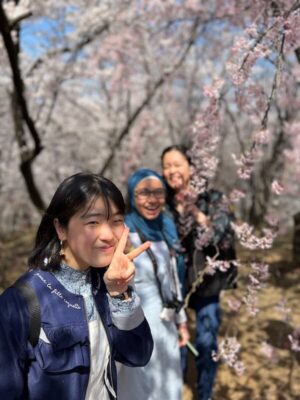 The hardest part, though, was applying to UWC ISAK. At Summer School 2021, Manaha was not confident in English. Still, the program convinced her that her place was in this high school. So she decided to do what looked impossible then and study English as hard as possible to apply for the 2022 entry as a Grade 10. Unfortunately, the application for high school started only one month after the end of Summer School, leaving her with precious little time to prepare. However, her parents were impressed at her dedication. “She learned all that and put all these efforts into her application independently, and her determination was infallible,” they said during her interview.
The hardest part, though, was applying to UWC ISAK. At Summer School 2021, Manaha was not confident in English. Still, the program convinced her that her place was in this high school. So she decided to do what looked impossible then and study English as hard as possible to apply for the 2022 entry as a Grade 10. Unfortunately, the application for high school started only one month after the end of Summer School, leaving her with precious little time to prepare. However, her parents were impressed at her dedication. “She learned all that and put all these efforts into her application independently, and her determination was infallible,” they said during her interview.
“I cried so much during the application process,” Manaha explains. She wasn’t confident about her application essay. She could have done better in group discussions with current students during the first part of the interview process. “I didn’t speak at all!” she remembers. She cried after the final interview as well. “That wasn’t from sadness, though, but relief. I felt like I had said everything I wanted during the interview.”
The results for UWC ISAK acceptance came four days before Manaha took the Japanese high school entrance exams. She screamed and cried again at receiving confirmation she was admitted as a Grade 10 student. But, instead of going to her exams, she enjoyed a well-deserved break.
Give back from the start
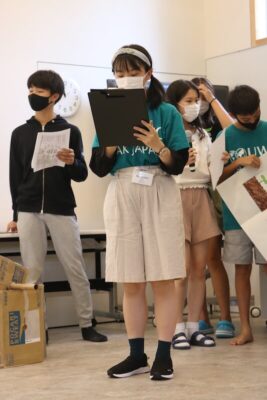 Manaha’s story could have stopped there. But it didn’t. On top of working on reducing food waste on campus and in the greater local area as she had started in Summer School 2021 and raising awareness on the importance of peace through hearing from the survivors of Hiroshima, Manaha also wishes for other Japanese students to access the type of education she has here at UWC ISAK.
Manaha’s story could have stopped there. But it didn’t. On top of working on reducing food waste on campus and in the greater local area as she had started in Summer School 2021 and raising awareness on the importance of peace through hearing from the survivors of Hiroshima, Manaha also wishes for other Japanese students to access the type of education she has here at UWC ISAK.
“I don’t like Japanese education,” she explains. “So I faced two options: 1. Escape it; 2. Improve it. Since I love Japan, I chose the latter.” Manaha really wanted to do something for Japanese education, which is getting progressively worse, in her opinion.
Meliorating education in Japan through technology
As for her other projects, Manaha has taken many actions to improve access to education and information for Japanese youth. She interned at the career agency Recruit and worked for the company’s app helping high school students with their university choices. She worked with three other university and high school students in a team to propose a new strategy to make the app more accessible for high school students. At first, her team couldn’t come up with good ideas and received negative feedback from judges. So Manaha –who was the youngest person in the team– tried to enhance communication and bonding among her team. Finally, her team received the best evaluation, which means that their ideas might be used in Recruit’s app improvement. On the side, Manaha occasionally records interviews with professionals that she then sells to schools for their career education. She is very interested in technology to enhance access to education and participated in two programming contests during her first year at UWC ISAK.
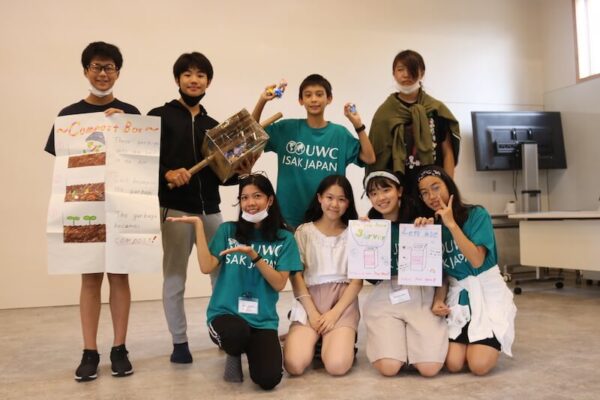
We can’t wait to see where Manaha’s leadership journey takes her next for the remaining time of her journey at UWC ISAK Japan.
Until then, please check out Part I and II of this series to learn more about Manaha’s other projects.
